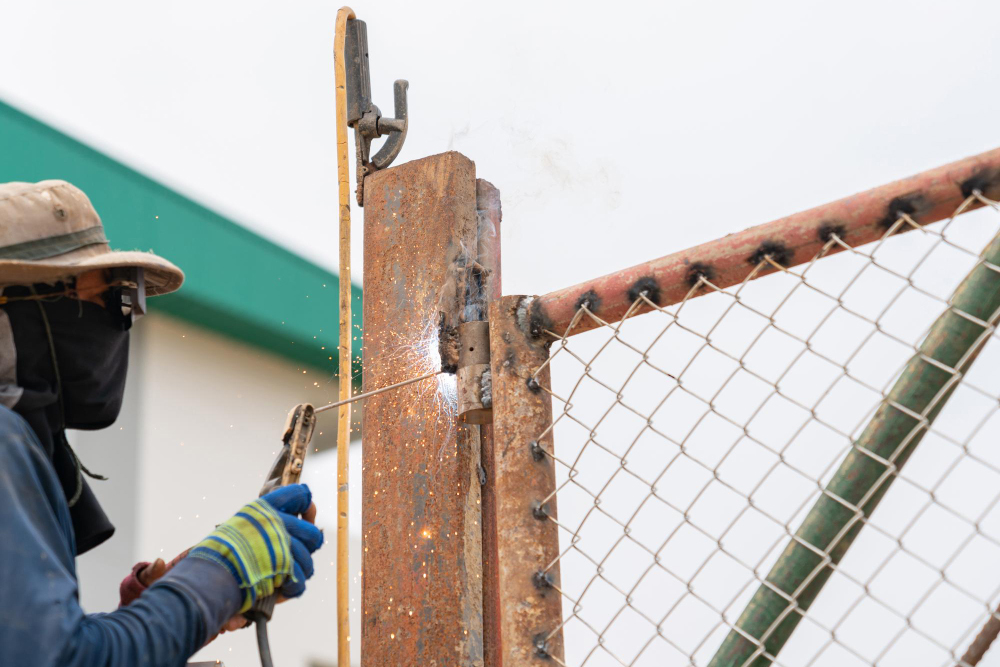What You Need to Know Before Installing Commercial Fencing

Installing a commercial fence represents a significant investment for any business. Whether you're securing a warehouse, defining property boundaries, or enhancing your company's curb appeal, the decisions you make during the planning phase will impact your business for years to come.
Commercial fencing differs substantially from residential projects in terms of scale, regulations, and long-term considerations. The stakes are higher, the requirements more complex, and the potential consequences of poor planning more costly. Understanding these factors before breaking ground can save you thousands of dollars and prevent major headaches down the road.
This guide walks you through the essential considerations every business owner should evaluate before installing commercial fencing, from regulatory requirements to material selection and ongoing maintenance needs.
Understanding Local Zoning and Permit Requirements
Before selecting materials or designs, research your local zoning laws and permit requirements. Commercial properties face stricter regulations than residential ones, and violations can result in costly fines or forced removal of non-compliant fencing.
Most municipalities require permits for commercial fencing projects, especially those exceeding certain height limits or located near property lines. The permit process typically involves submitting detailed plans showing fence placement, height specifications, and materials. Some areas also require setback distances from sidewalks, roads, or neighboring properties.
Contact your local building department early in the planning process. They can provide specific requirements for your zone and help you avoid common compliance issues. Many contractors experienced in commercial fencing in St Augustine, FL, can assist with permit applications and ensure your project meets all local codes.
Choosing the Right Fencing Material
Commercial fencing materials must balance durability, security, aesthetics, and budget considerations. Each option offers distinct advantages depending on your specific needs.
Chain Link Fencing
Chain link remains popular for commercial applications due to its affordability and durability. Modern chain link fencing comes in various gauges and coatings, including vinyl-coated options that resist rust and provide color choices. While not the most attractive option, chain link excels at perimeter security and requires minimal maintenance.
Aluminum Fencing
Aluminum fencing offers an attractive appearance without the maintenance requirements of iron or steel. It resists corrosion naturally, making it ideal for coastal areas. Though more expensive than chain link, aluminum provides excellent longevity and can enhance your property's professional appearance.
Steel and Iron Fencing
Steel and wrought iron fencing provide maximum security and an upscale appearance. These materials work well for businesses wanting to project strength and permanence. However, they require regular maintenance to prevent rust and corrosion, particularly in humid climates.
Vinyl Fencing
Vinyl fencing offers low maintenance and consistent appearance over time. It won't fade, crack, or require painting like wood alternatives. While the initial cost is higher than some options, vinyl's longevity often makes it cost-effective long-term.
Security and Access Control Considerations
Commercial fencing serves multiple security functions beyond simple boundary marking. Consider how employees, customers, delivery vehicles, and emergency services will access your property.
Plan gate locations strategically to control traffic flow while maintaining operational efficiency. Wide gates accommodate delivery trucks and emergency vehicles, while pedestrian gates provide convenient access for employees and visitors. Electronic access controls, including card readers and keypad systems, can enhance security while tracking entry and exit times.
Height requirements depend on your security needs and local regulations. Higher fences provide better security but may require additional permits and cost more to install. Consider whether your business needs anti-climb features, such as angled tops or security spikes.
Budgeting and Timeline Planning
Commercial fencing projects involve several cost components beyond material and installation. Permit fees, site preparation, utility marking, and potential landscaping restoration all impact your total investment.
Request detailed quotes from multiple contractors, ensuring each includes the same scope of work. Quality installations require proper ground preparation, accurate measurements, and skilled workmanship. Extremely low bids often indicate corners will be cut, potentially costing more in long-term repairs and replacements.
Timeline planning should account for permit approval, material delivery, weather delays, and potential utility complications. Most commercial fencing projects take longer than initially estimated, so plan accordingly if the installation timing affects your business operations.
Maintenance and Long-Term Care
Different fencing materials require varying levels of ongoing maintenance. Factor these costs into your decision-making process, as maintenance expenses can exceed initial installation costs over the fence's lifetime.
Metal fencing may require periodic painting or coating to prevent rust. Inspect hardware regularly, as gates and hinges experience the most wear. Vegetation control along fence lines prevents damage and maintains professional appearance.
Establish a maintenance schedule immediately after installation. Regular inspections catch small problems before they become expensive repairs. Keep documentation of your fence installation, including warranty information and approved permits.
Working with Professional Installers
Commercial fencing installation requires specialized knowledge of regulations, materials, and techniques. Professional installers bring experience that can prevent costly mistakes and ensure compliance with local codes.
Research potential contractors thoroughly. Verify licensing, insurance coverage, and references from similar commercial projects. Experienced commercial fencing contractors understand the unique challenges of business installations, including working around operational schedules and meeting specific security requirements.
Making the Right Investment for Your Business
Commercial fencing represents a long-term investment in your business property. Taking time to research requirements, evaluate options, and plan properly will ensure your fence serves your needs effectively for years to come.
Consider how your fencing choice reflects your business image. A well-designed, properly installed fence enhances your property's professional appearance and can contribute to your company's success. Conversely, a poorly planned or installed fence can detract from your business and create ongoing problems.
Remember that the cheapest option upfront often costs more over time through repairs, replacements, and compliance issues. Invest in quality materials and professional installation to maximize your fence's value and minimize future headaches.
If you need professional commercial fencing in St Augustine, FL, contact Masters Quality Fence today for free estimates. Their experienced team can guide you through the entire process, from initial planning to final installation.